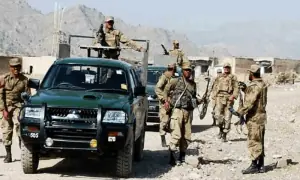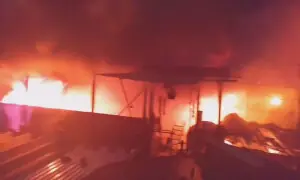Textile, apparel industry: Govt decides to substitute power, RLNG tariffs
4 min readThe Federal Government has decided to substitute electricity and RLNG tariffs for the textile and apparel industry, indicated for fiscal year 2021-22, with regionally competitive energy rates, well informed sources told Business Recorder.
The Ministry of Commerce informed the Economic Coordination Committee (ECC) of the Cabinet last week that a summary of October 11, 2021 regarding Textile and Apparel Policy 2020-25 was submitted to the ECC.
According to sources, a committee was constituted by the ECC, which held several meetings and recommended few changes which have been incorporated in the policy.
Accordingly, the report of the committee and the comparison in tabular form of the specific changes incorporated in the draft policy were presented to the forum in compliance with the ECC decision, and salient features of the policy were shared with the Committee.
The ECC was informed that the Technical Advisory Sub-Committee of the ECC, headed by the Advisor to Prime Minister on Finance and Revenue, Shaukat Tarin, deliberated upon the revised policy in its meeting held on December 16, 2021.
The draft of the policy was submitted by the Ministry of Commerce on December 13, 2021 for approval by the ECC with the amendments as suggested by the Power Division.
The ECC discussed the revised draft of Textile and Apparel Policy 2020-25 briefly as it was already cleared by the Technical Advisory Sub-Committee and approved it with the following amendments: (i) electricity and RLNG rates, indicated for fiscal year 2021-22, will be substituted, with regionally competitive energy rates ;(ii) the regionally competitive RLNG rates will be applicable on processing industry;(iii) for the captive and the cogeneration units, a separate policy will the formulated by the Ministry of Energy, in consultation with the Ministry of Commerce, which will cover the benefits and ;(iv) comments of the Finance Division shall be made part of the proposed Textile and Apparel Policy 2020-25.
Meanwhile, Prime Minister Office has also sought comments from the Power Division and Petroleum Division on suspension of gas supply to export sector in Punjab.
All Pakistan Textile Mill Association (APTMA), in its letter to Prime Minister Imran Khan, said that the Ministry of Energy had assured the Punjab export sector of continued gas supply provided they agreed to increase the price to $ 9 per MMBTU from $ 6.5. APTMA agreed to this in the presence of Abdul Razak Dawood.
Subsequently, the Ministry of Petroleum presented a Gas Management Plan to the CCoE on December 2, 2021 which stated that gas to Captive Power Plants (CPPs), whether co-gen or not, would be load shed starting December 15.
According to APTMA, the Punjab-based industry was thereof hit with a double whammy, i.e., increase in gas price at $ 9 double that of Sindh & KP, and load shedding from December 15, 2021.
APTMA, in its letter contended that under these circumstances, some member mills went to court on December 8, 2021 against CCoE decision for supply of entire six days and got stay citing discrimination against Punjab verses other provinces.
“The discrimination is not only in price but also in gas load shedding which is restricted to Punjab only despite the fact that 70% of the textile industry is based in Punjab, and the suspension of gas will bring 80% of the industry to a complete halt which will have an extremely negative impact on exports and will bring to an end the extremely positive increase in exports and investment witnessed during the last year,” said Executive Director, Shahid Sattar, Executive Director APTMA in his letter to the Prime Minister.
The Association further argued that if export industry was unable to deliver goods as per commitment with the buyers, orders once lost will be a permanent loss to Pakistan, and extremely difficult if not impossible to reverse.
The bulk of Punjab-based mills are co-generation and use gas to produce electricity as well as steam and hot water used in the manufacturing process.
Even if the additional electricity load could be accommodated the mills cannot generate steam & hot water from electricity. However, the truth of the matter is that the Discos are not in a position to supply additional power to the mills in any case.
Prime Minister has been informed that as most of the mills (80 per cent) will not be in a position to operate, the impact on employment would be extremely detrimental.
As a consequence, a large number of workers would be laid off in Punjab leading to many social and political consequences.
APTMA requested Prime Minister to intervene to put on hold the decision of suspending gas supply to Punjab. It also sought time from Prime Minister to plead the Punjab industry case.
According to sources, a ministerial committee comprising Advisor on Finance and Revenue, Energy Minister, Hammad Azhar, Minister for Industries and Production, Khusro Bakhtiar and Advisor on Commerce and Investment, Abdul Razak Dawood held a meeting consecutively for two days this week past on the issue of gas supply to the textile sector.
The sources maintained that after the delivery of hard-hitting arguments between the committee members on this issue, it has been decided to give 30 MMCFD RLNG to most efficient Punjab based textile mills only for processing purposes.
This article was originally published in Business Recorder on December 26 2021.
For the latest news, follow us on Twitter @Aaj_Urdu. We are also on Facebook, Instagram and YouTube.





















Comments are closed on this story.